In Japanese, ~ni naru ~になる (ni に adverbial copula plus naru なる) means "will become [in a different way]," "will be [a result]," "will get [a disease]," ~ni natte-iru ~になっている may mean to be treated in a way or to function in a way, o~/go~ni naru お~/ご~になる is a honorific expression (sonkeigo 尊敬語), ~you ni naru ~ようになる means "to start (or stop) doing something habitually/being able to do something," and ~koto ni naru ~ことになる means for things to end up in such way that something happens.
- {toumei ni} naru
透明になる
[It] will become {transparent}.
[It] becomes {transparent}.- toumei da 透明だ - "it's transparent."
- {happyaku-en ni} naru
800円になる
[It] will be {eight hundred yen}. - {kaze ni} naru
風邪になる
[You] will get {cold}. - {irie ni} natte-iru
入江になっている
To be an inlet. (to have become in a way one would consider to be an inlet, and remained that way since ever.) - hon wo o-yomi ni naru
本をお読みになる
[His majesty/my lord/etc.] will read a book.
- hon wo yomu
本を読む
To read a book.
[Some random dude] will read a book.
- hon wo yomu
- {{hon wo yomu} you ni} naru
本を読むようになる
To become {in a way [that] {reads books}}.
To start reading books.- watashi wa yoku hon wo yomu
私はよく本を読む
I often read books.
- watashi wa yoku hon wo yomu
- {{hon wo yomanai} you ni} naru
本を読まないようになる
To become {in a way [that] {doesn't read books}}.
To stop reading books.- watashi wa hon wo yomanai
私は本を読まない
I don't read books.
- watashi wa hon wo yomanai
- {{koukai suru} koto ni} naru
後悔することになる
Things will become {so that {[you] will regret [it]}}.
It will be so that you'll regret it.
Grammar
See the article about naru なる for details about the grammar and conjugation. This article is for examples only.
The phrase ~ni suru ~にする is the causative counterpart of ni naru.
The phrase ~ku naru ~くなる means the same thing as ~ni naru but is used with i-adjectives instead.
The phrase ~you ni naru ~ようになる is used with verbs expressing stative predicates: stative verbs and the habitual sense of eventive verbs.
The phrase ~koto ni naru ~ことになる is used not when something changes in quality, but when the circumstances, the situation changes in a way, becomes such, or ends up such.
Examples
Noun + になる
- Context: the protagonist confesses to his mother his aspirations.
- boku, mangaka ni naru
僕 マンガ家になる
I'll become a mangaka. - dame
駄目lol no u wont
No. - suggee sokutou
すっげー即答
[That was] an extremely fast answer.- She didn't even think twice.
- Context: an emotional scene.
- See: motion lines for the vertical line effect.
- kimi wa hiiroo ni nareru
君はヒーローになれる
You can become a hero.- nareru - potential form of naru.
- Context: Yoshida Yuuko 吉田優子, who recently grew horns and found out she's a demon girl, meets her ancestor in a dream.
- yo wa onushi no sosen!!
余はおぬしの先祖!!
I'm your ancestor! - yami no ichizoku no shiso da!!
闇の一族の始祖だ!!
The founder of the darkness clan!! - {anta ga sono sugata ni natta} hi ni ippen atta darou!
あんたがその姿になった日にいっぺん会っただろう!
We've met on the day {you became in that form (with the horns)}, [haven't we]?!- natta - past form of naru.
- yume no naka de!!
夢の中で!!
Inside a dream!! - gosenzo-sama...?
ごせんぞさま・・・?
Ancestor...? - dai-ichi-wa boutou sankou
第一話 冒頭 参照
Consult: First Chapter, Beginning. (where they first met in a dream.)
- Context: it's Christmas and a grade school student is cleaning the school windows. But why?
- watashi {kyonen wa {ii} ko janakatta mitai de} Santa-san kite-kurenakatta-n-desu
私去年は良い子じゃなかったみたいでサンタさん来てくれなかったんです
It seems {last year I wasn't a {good} child} so Santa-san didn't come [for me]. - dakara kotoshi wa {{ii} ko ni} narou to omotte!
だから今年は良い子になろうと思って!
So [I] thought: this year [I] will become {a {good} kid}!- narou - volitional form of naru. Normally it means "let's become" when told to others, but this usage where you tell yourself "let's become" = "I should become" also exists.
- Context: anime attempts inter-species communication, circa 2014, colorized.
- {anata jishin mo {inu no kimochi ni} natte} hanashi-kakeru
あなた自身も犬の気持ちになって話しかける
{You yourself too become {the dog's feelings} and} start talking. (literally.)- In the sense of having the same feelings as the dog.
- You put yourself in the dog's shoes and try talking to him.
- You make yourself feel like a dog and start talking to him.
- You make yourself think like a dog and start talking to him.
- hanashi-kakeru
話しかける
To start talking with someone. (in this case, with the dog.) - anata jishin mo
あなた自身も
You yourself too. You too. (the dog already thinks like a dog, so the point is that you, too, think like a dog.)
- sou sureba {inu no itte-iru} koto mo wakaru to iu mono desu yo
そうすれば犬の言っていることもわかるというものですよ
If [you] do that, [you] will understand what {the dog is saying}. - wan' わんっ
Woof.
- Context: Edward Elric エドワード・エルリック drags his younger brother into a life of crime.
- yooshi
よーし
Aaalright. - ima kara {choito hou ni fureru} koto suru kedo
今からちょいと法に触れる事するけど
[Starting] now, [I] will do something [that] {violates the law a bit}.- choito
ちょいと - chotto
ちょっと
A bit. A little. - hou ni fureru
法に触れる
To touch the law. To collide with the law. To violate the law. - fureru
触れる
To touch. (as a matter of fact: ended up touching, brushing against.)- sawaru
触る
To touch. (intentionally: he touched the cat, petting it.)
- sawaru
- choito
- omae φ {mite-minu} furi shiro
おまえφ見て見ぬふりしろ
As for you, pretend {not to see [anything]}.- mite
見て
To see, and... - minu furi
見ぬふり
Pretend not to see.
- mite
- yoisho~~
よいしょ~~
[Heave-ho!]- Expression of effort, he used it when climbing.
- he!?
へ!?
[What]!? - ...sore tte {hanzaisha ni} nare tte koto?
・・・それって犯罪者になれってこと?
...is that: "become {a criminal}," is what you're saying?- You're telling me to cooperate in a crime!
- ni nare - meireikei 命令形 (imperative form) of ni naru.
- dame ka?
ダメか?
Is [that] no good?
Is that not okay?
Will you not help me? - pan
パン
*clap*
- Context: Koro-sensei 殺せんせー, a teacher, talks to Shiota Nagisa 潮田渚, one of his students.
- sensei wa ne, Nagisa-kun
先生はね 渚君
Nagisa-kun, [about me], [you see]- In this line, Nagisa's teacher uses sensei, "teacher," as a first person pronoun. This is possible because he's talking to Nagisa, whom he's teacher of.
- {aru hito to no yakusoku wo mamoru} tame ni {kimi-tachi no sensei ni} narimashita
ある人との約束を守るために君達の先生になりました
In order to {keep a promise with a [certain] person} {[I] became your teacher}.- narimashita - past form of narimasu なります, polite form of naru.
- kimi-tachi no
君達の
Your. (plural, as the teacher "of you students.")
- aitsu zettai "chuunibyou" da yo na~~
アイツ絶対「中二病」だよな~
He's definitely chuunibyou, [isn't he?]- chuunibyou 中二病 - "middle school second year syndrome," a slang for acting edgy that typically manifests in the second year of middle school.
- {kou-ni ni} mo natte, mattaku
高二にもなって 全く・・・
[Even] after becoming a high school second year [student], [good grief]...- mo も - "even" in this sentence, marks the adverb, so it comes after ni, but before naru.
- Context: Takamine Kiyomaro 高嶺清麿 speaks to his concerned mother.
- yakamashii'!!!
やかましいっ!!!
[You're] noisy!!!
[Stop annoying me!!!] - ore-sama ga, nande {anna {tei-reberu na} yatsura to tomodachi ni} nan'nakya ikenee-n-da yo'!!?
オレ様が、なんであんな低レベルな奴らと友達になんなきゃいけねーんだよっ!!?
Why do I have to become {friends with {low-level} guys like those}!!?- nan'nakya ikenee - contraction of naranakereba ikenai ならなければいけない.
- {tomodachi ni} naru
友だちになる
To become {friends}.
- Context: Saitama サイタマ, who was about to become a salaryman, meets a monster that wants to murder children and remembers what he really wanted to become.
- sarariiman janakute, {{temee mitee na} {akarasama na} akuyaku wo ichigeki de buttobasu} hiiro ni naritakatta-n-da yo
サラリーマンじゃなくて テメーらみてーなあからさまな悪役を一撃でぶっ飛ばすヒーローになりたかったんだよ
Not a salaryman, [I] wanted to become a hero [that] {[sends flying] {blatantly} evil-guys {like you} with a single attack}.
- Context: Saiki borrows his father's glasses without permission.
- oi~~ megane kaeshite yo~~
オイ~~眼鏡返してよ~
Heey, give [my] glasses back~~ - gaman shite kure chotto me ga "san" ni naru dake daro
我慢してくれちょっと目が「3」になるだけだろ
Please endure [it], [all that will happen is that] [your] eyes will become "threes."- In anime, eyes are drawn like 3's sometimes when a character that needs glasses isn't wearing them.
- megane ga nai to hotondo mienai-n-da yo~~
眼鏡がないとほとんど見えないんだよ~
Without [my] glasses [I] almost can't see. - yon!?
4!?
Fours!?
- Context: Furutani Himawari 古谷向日葵 competes with Oomuro Sakurako 大室櫻子 for the student council presidency.
- makemasen wa yo
負けませんわよ
[I] won't lose. - {jiki seitokai fukukaichou ni naru} no wa kono watakushi desu wa!
時期生徒会副会長になるのはこのわたくしですわ!
The one [who] {will become the next student council vice-president} is this me!
It's I [who] {will become the next student council vice-president}!- watakushi - polite first person pronoun.
- kono watakushi - see kono ore da この俺だ.
- wa, watashi datte makenai mon!
わ 私だって負けないもん!
I-I won't lose [either]! - toiuka Himawari niwa makenai kara'
というか向日葵には負けないからっ
Or rather, [I] wouldn't lose to [you], Himawari. - ugugu'
うぐぐっ
*frustration* - aikawarazu {namaiki na} ko desu wa
相変わらず生意気な子ですわ
As always, [you] are an {impertinent} child. (literally.)
[You] are impertinent as always.
- Context: a daughter goes shopping.
- koko wa sugoi naa
ここはすごいなー
This place is amazing, [huh]~ - are mo kore mo {hoshii} mono takusan~
あれもこれも欲しい物たくさんー
This, that, [there are] lots of things [that] {[I] want}~ - {hachi-juu go-man nana-sen hyaku ni-juu en ni} narimasu
八十五万七千百二十円になります
[It] will be {857120 yen}.
- Context: Nobita のびた's father told him to do chores outside, despite his complaints about the heat. So Nobita complains even more.
- konna hi ni soto e detara, nissha-byou ni naru zo.
こんな日に外へ出たら、日射病になるぞ。
If [I] leave in a sun like this, [I] will get a sunstroke! - otousan wa, jibun no kodomo ga, kawaikunai no darou ka.
おとうさんは、自分の子どもが、かわいくないのだろうか。
To father, [his] own child isn't pitiable, [I wonder]? - wakatta!
わかった!
[I got it]! - boku wa hontou no ko janai-n-da.
ぼくは、ほんとうの子じゃないんだ。
I'm not [his] real child.
- Context: Sakata Gintoki 坂田銀時 being the boke ボケ for Shimura Shinpachi's 志村新八 tsukkomi ツッコミ.
- sou... karushiumu da
そう・・・カルシウムだ
[That's right]... calcium. - {karushiumu sae tottokya} subete φ {umaku} iku-n-da yo
カルシウムさえとっときゃ全てうまくいくんだよ
{If [you] just took calcium}, everything would go {well}, [you see].
All you need to do is ingest calcium, and everything will go well.
- tottokya - contraction of totte-okeba とっておけば.
- ichigo gyunyuu
いちご牛乳
Strawberry cow-milk. - juken sensou, oya to no kakushitsu, {ki ni naru} ano ko
受験戦争 親との確執 気になるあの娘
The exam war, discord with [your] parents, that girl [that] {[you] are interested into}.- Exam war refers to university entrance exams and the competition surrounding it.
- ki ni naru - to become interested in, to become curious about, to mind (unconsciously). c.f. ki ni suru 気にする, "to mind (consciously)," "to be bothered by."
- toriaezu {{karushiumu tottokya} subete φ {umaku}...
とりあえずカルシウムとっときゃ全てうまく・・・
Anyway {if [you] take calcium} everything [will go] {well}... - iku} wake φ nee daro!!
いくわけねーだろ!!
[There's no way that's true]!!- A tsukkomi ツッコミ.
- There's no way to translate the phrases above literally, because one completes the other, and the first one ends in the adverb umaku, "well."
- subete ga {umaku} iku
すべてがうまくいく
Everything will go {well}. (what Gintoki intended to say.) - {subete ga {umaku} iku} wake ga nai
すべてがうまくいくわけがない
There's no way [that] {everything will go {well}}. (how Shinpachi completed the sentence.)
- {ikura karushiumu tottetatte} naa, {kuruma ni hanerarerya} hone mo oreru wa!!
幾らカルシウムとってたってなァ車にはねられりゃ骨も折れるわ!!
{No matter how much calcium [you] take}, [you see], {if [you] get hit by a car} [your] bones break!!- ~tatte ~たって - same as ~temo ~ても.
- hanerarerya - contraction of hanerarereba はねられえば, ba-form of passive form of:
- haneru
跳ねる
(For a car) to hit [someone].
- Context: Gintoki sees something kimochi-warui 気持ち悪い.
- kimochi-warukunai!
Erizabesu da
気持ち悪くない!エリザベスだ
[It's] not disturbing! It's Elizabeth. - {tantai de miru} to soo demo nee ga
単体で見るとそーでもねーが
If {[you] look at [it] separately} it's not so but... - {{omae to setto ni} naru} to kimochi warii yo
お前とセットになると気持ちワリーよ
if {[it] becomes {a set with you}} [it] is gross.
when it is accompanied by you it's gross. - tteiuka omae ga kimochi warui!
っていうかお前が気持ち悪い!
Or rather, you are gross!
- Context: an important component of a machine is split into pieces on the floor.
- sore shinzou-bu (batterii) de na
それ心臓部でな
That's the heart [of the machine] (battery), [you see].- batterii is gikun.
- hontou wa {haato-gata ni} naru hazu yanen
本当はハート型になるはずやねん
It's actually supposed to become {heart-shaped}. - demo tabii no kaiten to anka no netsuryou ga umaku setsuzoku dekehenkute
でもタビーの回転とアンカの熱量が上手く接続でけへんくて
But [I] can't seem to connect well the spin of the tabii to the heat of the anka.- The words tabii タビー and anka アンカ sound like "turbine," taabin タービン and "anchor," ankaa アンカー, but are clearly spelled differently. Probably just random technobabble.
- dekehen
でけへん
Not able to. (kansaiben for dekinai.)
- konna koto iutemo wakara
こんなこと言うても分から
Even if [I] say this you wouldn't underst... - uso yaan
嘘やーん
[No way!]- While Kiriwo was babbling, Iruma put the pieces together!
- Context: see yotsugana 四つ仮名.
- di tte naa
痔ってなぁ
Hemorrhoids, [you know]. - ......e?
・・・・・・え?
......huh? - yoo hiragana de "ji"
yanakute "di" tte
kaku yankaaa
よーひらがなで「じ」やなくて「ぢ」って書くやんかぁ
(same meaning as...)- yoku hiragana de "ji"
janakute "di" tte
kaku janai ka
よくひらがなで「じ」じゃなくて「ぢ」って書くじゃないか
Often, it's spelled with hiragana not as "じ" but as "ぢ" isn't it? - 「」 - quotation marks.
- yoku hiragana de "ji"
- futsuu "chi" ni tenten
nanka tsukawahen yo naaa
普通「ち」に転々なんか使わへんよなぁー
Normally you don't add dots to "ち", right? - sonde kono mae jisho de
shirabetara "di" mo {"ji" ni}
nattotta-n-yoo
そんでこの前辞書で調べたら「痔」も「じ」になっとったんよー
So, the other way [I] checked the dictionary and "痔" had become {"じ"}.- ni nattotta - same as ni natte-ita になっていた.
- ...sou ka
・・・そうか
[I see].
~ことになる
- Context: an over-protective father has a sudden and suspicious change of heart regarding his daughter's relationship with the male main character, who narrates:
- {kyou ichinichi ore-tachi wa mujintou de asobu} koto ni natta!
今日一日 俺達は無人島で遊ぶ事になった!
Things ended up so that {today, for the whole day, we will have fun on a deserted island}. - za za za zaaa
ザザザザァァ
*sound of water splashing under the boat* - demo {hontou ni} igai janee
でも本当に以外じゃねー
But it's {really} unexpected, isn't it? - {watashi-ra no kekkon ni mouhantai datta} ano otouchan ga...
私らの結婚に猛反対だったあのお父ちゃんが・・・
That father [who] {was vehemently against our marriage}...- ano otouchan - literally "that father," in this sentence, means "my father," but in respect to how he was in the past, at "that" time.
- futari de mujintou de asonde-koi nante nee~~~!
二人で無人島で遊んで来いなんてねェ~~~!
[told us] "go play only you two alone on a deserted island," huh~~~!- The first de で particle here limits number: futari de, "only two people," "only us two," "us two alone."
- The second de で particle marks the location: mujintou de, "on a deserted island."
- asonde-koi - imperative form (meireikei 命令形) of asonde-kuru 遊んで来る, "to go play [there] and come back [here]."
- The father told them go to have fun on a deserted island, thus "things became such that" they'll go have fun on a deserted island.
- Context: Vegeta sent his underling to fight Kakarot. His underling lost. Vegeta is perplexed.
- nasakenai yatsu da
なさけないやつだ・・・・・・
[What a] pathetic guy.- Referring to a guy who just lost to Kakarot.
- masaka {ano Kakarotto aite ni kono ore ga wazawaza ugoku} koto ni naru towa na......
まさかあのカカロットあいてにこのオレがわざわざ動くことになるとはな・・・・・・
[It's unbelievable that] it ended up in such way that {against that Kakarot, I have to [fight]}.- In other words: Vegeta didn't expect he'd have "to move," ugoku 動く. He expected his underling to handle it. So he wouldn't have to act, he wouldn't have to fight Kakarot.
- However, since his underling lost, the "situation became in such way that" it's necessary for him to make a move.
- That's what koto ni naru is expressing: the situation ended up that way.
Adjective + になる
- Context: Takagi 高木 sees the outcome of her teasing.
- a-ha-ha-ha-ha.
あはははは。
*laughs.* - kao, {makka-kka ni} natteru yo!
顔、真っ赤っかになってるよ!
[Your] face, [it]'s turned {really red}!- ni natteru - contraction of ni natte-iru.
- a-ha-ha-ha.
あははは。
*more laughs.*
- Context: Saiki Kuniharu 斉木國春 literally begs for his job back.
- onegai shimasu! mou ichido koko de hatarakasete kudasai!!
お願いします!もう一度ここで働かせて下さい!!
Please! Let [me] work here again! - nanda omae, {kutsu φ nameru} no φ {heta ni} natta naa
何だお前 靴舐めるの下手になったなぁ
[What's up with] you, [you suck at] {licking shoes} [now], uh.
- nanda omae - emotive right-dislocation.
- omae wa nanda?
お前何だ
You are what? (literally.)
What's up with you? What happened to you?
- omae wa nanda?
- kutsu φ nameru - same as kutsu wo nameru.
- ~no φ heta ni natta - same as ~no ga heta ni natta.
- heta ni naru
下手になる
To become unskilled.
To become worse at doing something.
To suck at doing something now.
- nanda omae - emotive right-dislocation.
- maruku osamatte yokatta ne~~
丸く収まってよかったね~
[Good thing] [it] ended up well, huh~- marui
丸い
Round. (literally.)
Ending without trouble. Ending well. - osamaru
収まる
To be contained. To fit in.
For an issue to be settled. - ~te yokatta
~て良かった
I'm glad that...
It's a good thing that...
- marui
- Context: the student council president explains the power of the kabedon 壁ドン.
- ore to tsuki-ae......
俺と付き合え・・・・・・
[Go out with] me......- tsuki-au
付き合う
To do an activity with someone.
To hang with.
To go out with.
To date with.
- tsuki-au
- ......to
・・・・・・と
(quoting particle, implies the phrase before is a quote.)
[......you say something like that.] - totsuzen kabe ni oitsumerare
突然 壁に追い詰められ
Suddenly being cornered into a wall... - onna wa {fuan ni} naru ga
女は不安になるが
the woman becomes {uneasy} but... - {mimimoto de ai wo sasayaita} totan
耳元で愛を囁いた途端
The moment {[you] whisper love close [to her] ear}...- mimimoto de
耳元で
At ear's base. (literally.)
Close to the ear. (adverb.)
- mimimoto de
- fuan wa tokimeki e to kawari
不安はトキメキへと変わり
Uneasiness turns into fluttering, and... - kokuhaku no seikou-ritsu ga agaru
告白の成功率が上がる
The success rate of the confession increases.
- Context: Mizunashi Akari 水無灯里, a wannabe gondolier, gets nervous rowing a boat for the first time, rowing too fast until the passenger tells her to slow down.
- sumimasen...
すみません・・・
Sorry... - kinchou de {ware wo wasure-sou ni} narimashita
キンチョーで我を忘れそうになりました
[I] became {close to forgetting myself} due to nervousness. (literally.)- ware wo wasureru
我を忘れる
To forget oneself.
To be so focused in doing a task that you forget your own existence, in the sense of doing only one thing and forgetting about your surroundings (the passenger), or a greater objective.
- ware wo wasureru
~ようになる
- Context: a salaryman recalls the backstory.
- hyonna koto kara {ochikadzuki ni} nari
ひょんなことからお近づきになり
Due to something strange [happening], [we] became {acquaintances}, [then]...- nari is a ren'youkei 連用形 and can be used to connect an event to a subsequent one, translating here as "to become X, and then..."
- {iinkai daka de rasshu-ji ni toukou shinakya naranai} getsuyoubi dake
委員会だかでラッシュ時に登校しなきゃならない月曜日だけ
Only in the Mondays, [when] {[she] has to go to school at rush hours due to [something related] to a [school] committee}... - {chikan boushi no bodhii gaado wo oosetsukaru} you ni nattari shite
痴漢防止のボディーガードを仰せつかるようになったりして
[I] end up becoming {[her] anti-groper body guard}.- oosetsukaru - to be assigned a job. In the habitual: "I usually get assigned this job on Mondays," with ni naru: "I started getting assigned this job on Mondays," I didn't usually get assigned, now things became so that I do.
Functional ~になっている
- Context: Alex talks about what he heard from the children.
- Arekusu: {mura no tatefuda kara
minami ni yon-po higashi ni yon-po no} tokoro ga
{himitsu no asobi-ba ni} natte-iru toka.
アレクス「むらの たてふだから
みなみに4ぽ ひがしに4ぽ のところが
ひみつの あそびばに なっているとか。
Alex: the place
{four steps to south four steps to east from the village's sign}
has become {a secret playground} or something like that.- Functions as a secret playground.
- Context: the student council president thinks a quiz question doesn't make sense.
- bakabakashii...
馬鹿馬鹿しい・・・
[What a waste of time.] (This is stupid.) - konna mono {mondai ni} natte-inai!!
こんなもの問題になっていない!!
Something like this hasn't become a question!! (literally.)- i.e. it's such a bad quiz question it doesn't meet the minimum requirements for the character to acknowledge it's actually a question, that it functions as a question.
- He thinks quiz questions shouldn't be like this.
- Context: Kurogoma Katsuo 黒駒勝男 explains the perfect ratio of rice crackers to peanuts.
- Note: kakipii 柿ピー is common mixture of two snacks, kaki no tane 柿の種, which is rice cracker shaped as a "persimmon seed," and peanuts.
- This character speaks in Kansai dialect.
- kaki to piinattsu no wariai wa hichi tai san ni kimattoru yaroo gaaa!!
柿とピーナッツの割合は7:3に決まっとるやろーがァァ!!
The ratio of rice crackers to peanuts is [obviously] 7:3!!- See shichi-san-wake 七三分け for details.
- kimattoru yarou - same as kimatte-iru darou 決まっているだろう.
- yo no naka no koto wa subete kore, {hichi tai san de picchiri umaku wakerareru} yoo nattonja!!
世の中の事は全てコレ 7:3でピッチリうまく分けられるよーなっとんじゃ!!
Everything in the world is this (like his hair), [created so that] {[one] can divide [it] perfectly into seven to three}!- wakerareru yoo ni nattonja - same as wakerareru you ni natte-iru-n-da 分けられるようになっているんだ.
- wakerareru - "to be able to divide," potential form of wakeru 分ける, "to divide."
- hichi tai san ga uchuu banbutsu kongen no ougonhi ja, boke kora kasuu!!
7:3が宇宙万物根元の黄金比じゃボケコラカスぅ!!
Seven to three is the golden ratio of the origin of all creation in the universe, *expletives*!!
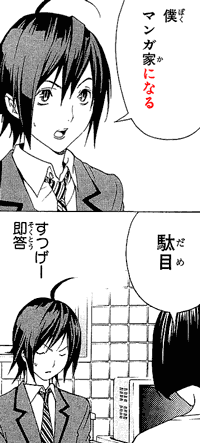
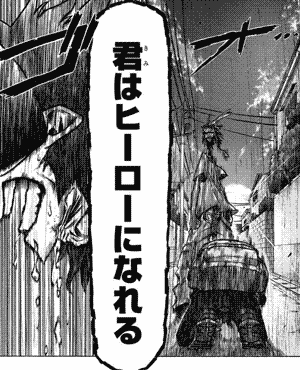

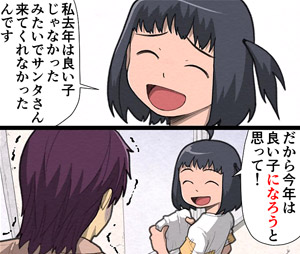
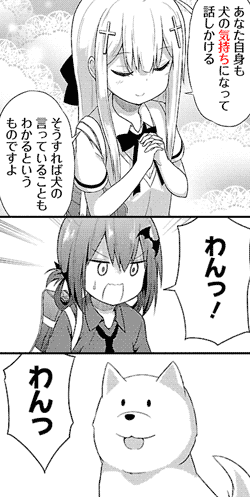
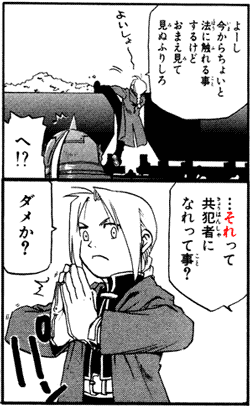
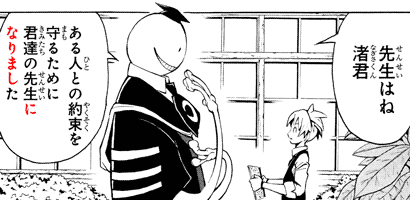
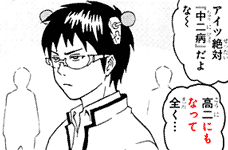
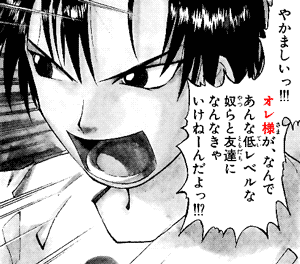

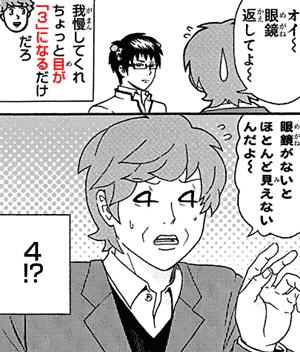
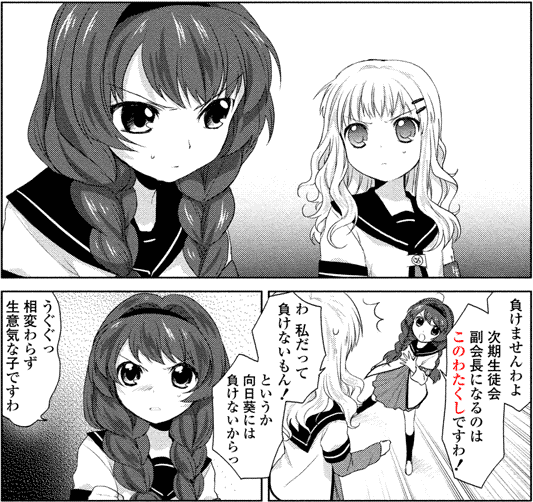
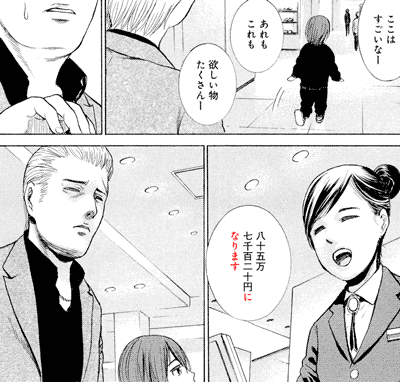

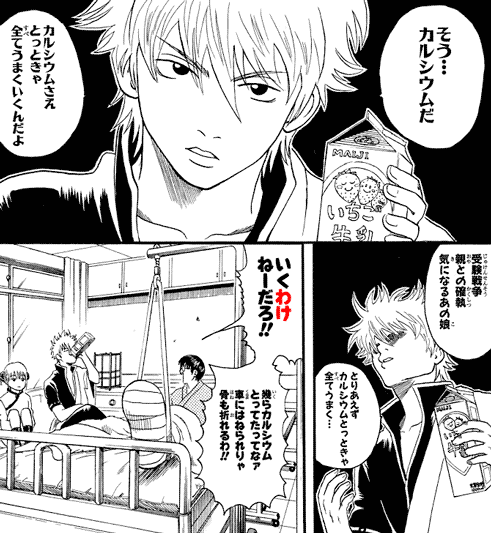
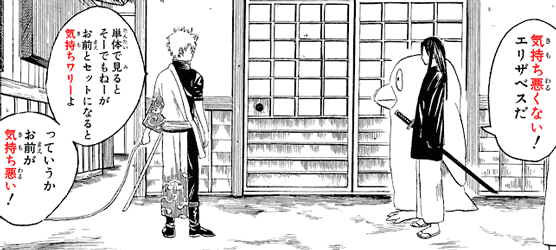
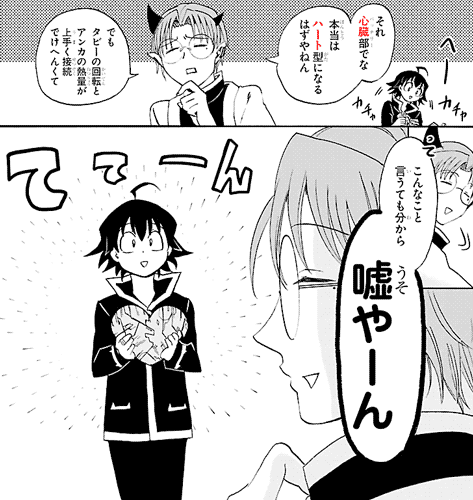
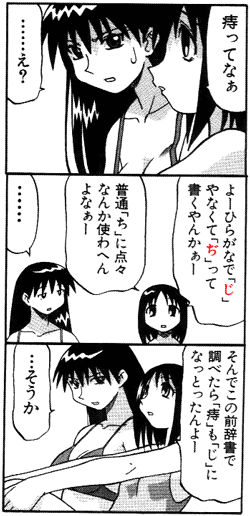
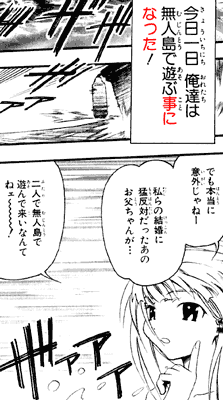
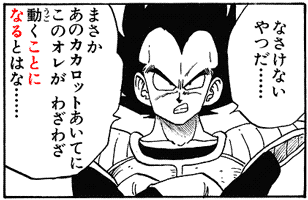
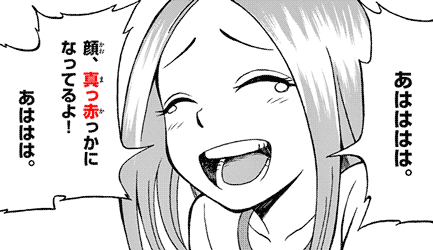
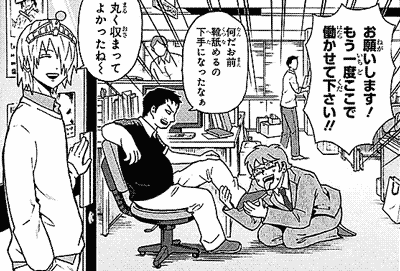
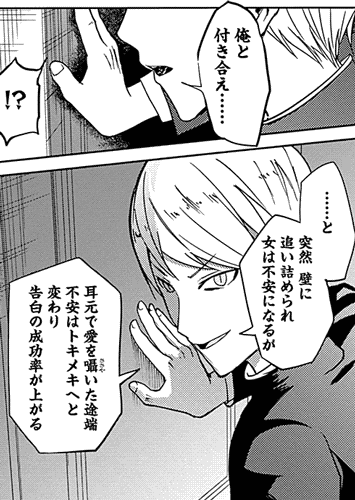
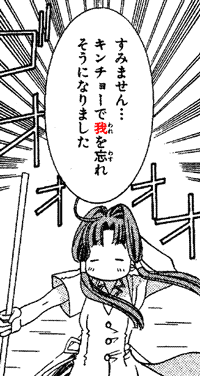
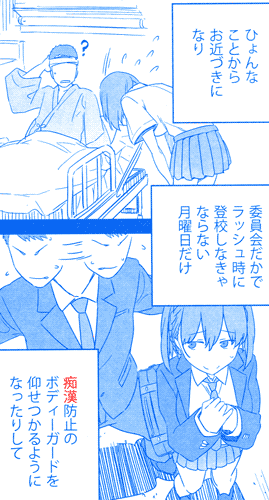
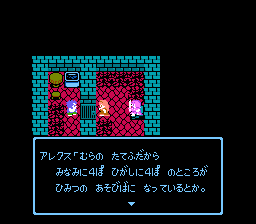
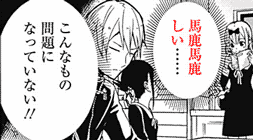
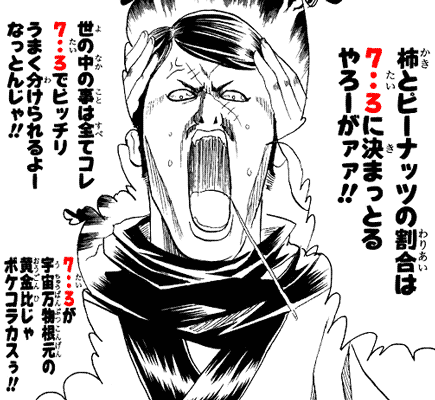
No comments: